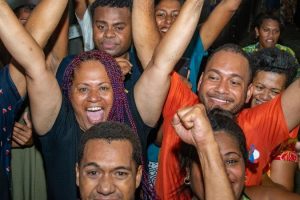Fiji turmoil ends as one former coup leader replaces another

Allegations of voter fraud. Threats of military intervention. A police interrogation of political leaders.
Six days of turmoil over Fiji’s general election ended on Tuesday with the ousting of a 16-year strongman leader who had embraced China and eroded democratic norms in the country.
After fierce negotiations to form a three-party alliance, Sitiveni Rabuka, the head of the centre-right People’s Alliance, is now poised to become prime minister, replacing the country’s long-time leader, Frank Bainimarama.
People’s Alliance supporters celebrate Sitiveni Rabuka’s return to the top job in Suva, Fiji.Credit:Getty Images
The return of Rabuka, who led the country from 1987 to 1999, would pave the way for a potential pivot by Fiji, a small but geopolitically important nation in the Pacific where the United States and China are fighting for influence.
While Bainimarama aligned Fiji more closely with Beijing, Rabuka is expected to favour a stronger relationship with Australia and New Zealand, the region’s historical powerhouses and close allies to the United States. His party also ruled out a proposed security deal with Beijing, like the one signed by the Solomon Islands and China earlier this year.
Rabuka, who initially contested the results after the vote last week, citing irregularities in the counting, described the outcome as the start of a new chapter for Fiji.
“The people have spoken,” he said. “People have chosen. A new way, a new path, a new government.”
Six days following the Fiji Election, Stitiveni Rabuka secured the role of Prime Minister after his party, the People’s Alliance, secured the votes of the Social Liberal Democratic Party to form government.Credit:Getty Images
Video footage posted on Twitter showed supporters at the People’s Alliance headquarters in the capital of Suva on Tuesday erupting in cheers, singing and applause.
Outside the South Pacific, Fiji, an island nation of about 1 million people, is seen as a remote vacation idyll: frangipani flowers, golden beaches, cobalt seas. But within the region, it is a critical player with a major economy and a strong military. Among its neighbours, it tends to set the tone on human rights and democratic freedoms, which in recent years have appeared under threat.
It is also a country in which seemingly peaceful politics can degenerate quickly. It experienced four coups between 1987 and 2006. Rabuka originally seized power in the first coup, and Bainimarama in the last one.
Now outgoing Prime Minister Frank Bainimarama casts his vote at the Fiji elections in Suva last week.Credit:AP
The vote this month was the third general election since democratic voting was reintroduced to the constitution in 2013. Turnout this year, at just over 68 per cent, was the lowest in history.
Speaking on Sunday, before the three-party coalition was formed, Rabuka described the results of the election as pivotal. “For those who follow, the generations to come,” he said, “they will look back at the election and say that was the turning point in Fiji’s journey.”
When the final results were announced, Bainimarama’s nationalist FijiFirst party had the single largest voter share, with 26 seats in parliament out of a possible 55. Rabuka’s People’s Alliance took 21, and its ally the National Federation Party an additional five. And the Social Democratic Liberal Party (SODELPA), a religious Indigenous-led party, won the final three seats.
Without a clear winner, it was a tight call to form a government, with the tiny party of SODELPA taking the lead role.
SODELPA’s public list of demands was considerable. In early talks, its leaders called for a deputy prime minister role for a party member, as well as a promise to support pro-Indigenous policies, a forgiveness of some student debt and the establishment of a Fijian embassy in Jerusalem.
The People’s Alliance was founded by Rabuka last year, after he walked away from SODELPA, taking a significant portion of its support with him. That history made for a complicated dynamic: there was a natural partnership between the two parties, but antagonism between Rabuka and some SODELPA members left behind continued to fester.
In the end, 16 members of SODELPA’s management board voted in favour of a partnership with the People’s Alliance and 14 with FijiFirst.
“People have chosen a new way, a new path and a new government,” said Biman Prasad, the leader of the National Federation Party. He added: “A new era will be starting as the new government takes on the power in this country.”
The election had been messy from the start.
After the first batch of votes was counted and then released hours behind schedule, the People’s Alliance party appeared to be in the lead – until the official election results app went dark for hours, in what officials described as a vote-counting anomaly. When the app began working again, the party’s lead had vanished, and Bainimarama’s party was in front.
Fijians quickly cried foul. Five political parties, including Rabuka’s, said they would call for a recount because they had no faith in the integrity of election officials. Impartial election observers said they had not seen “significant irregularities” or any evidence of misdoing.
As they prepared to contest the election results, opposition party leaders including Rabuka asked the military to intervene in the election, as is its constitutional right.
Jone Kalouniwai, the top commander, said the military would instead allow the electoral process to play out. The military “will leave it in the good hands of those responsible [for] the electoral process under the 2013 constitution,” he added.
The next day, Rabuka was summoned by police and interrogated for two hours about his activities over the week. He was ultimately released without being charged.
Since casting his vote last Wednesday, Bainimarama has not spoken publicly and has yet to concede the election.
This article originally appeared in The New York Times.
Most Viewed in World
From our partners
Source: Read Full Article



